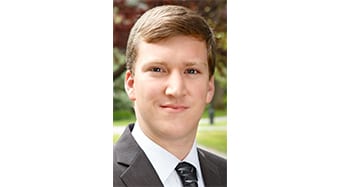If you’re at odds with political beliefs opposite your own, chances are your perceptions of “the other side’s” thinking may be exaggerated and often times are wildly inaccurate, according to two studies involving a researcher in the Wilbur O. and Ann Powers College of Business.

Jeff Lees, a visiting professor in Clemson University’s John E. Walker Department of Economics, says the chasm caused by such political polarization can be reduced if those with differing viewpoints are provided a more accurate account of the other side’s beliefs.
“Our global and U.S.-focused research shows that people grossly overestimate the negative feelings our political foes have of us,” said Lees, who received his Ph.D. in organizational behavior and psychology from Harvard. The general point, according to Lees, is, you likely agree a lot more with your perceived political opponents than you actually think and you likely believe they dislike you much more than they actually do.
“One cause of polarization is false beliefs about the other side. One way to narrow the divide between political foes is by providing them an accurate account of the other side’s true feelings. When the truth is told, people feel differently. In other words, telling me my perception is inaccurate makes my perceptions of you less negative,” Lees added.
In 2019, Lees and then-Harvard colleague Mina Cikara published a paper on U.S. political polarization in the journal Nature Human Behavior. Lees then joined a group of over 80 researchers on a global paper published this April in the same journal that found false polarization was present in 25 of 26 countries, with some having a larger bias than in the U.S.
False polarization means that one’s beliefs about political opposites are inaccurate, leading to misperceptions that have societal consequences, including polarization and intergroup conflict that, among other things, result in aggressive narratives in traditional and social media channels, and the workplace.
Such political polarization leads to intergroup conflict that can also have serious implications in the workplace, according to Lees.
“These false beliefs take their toll beyond personal prejudices against political foes. Business can be affected through turnover, counterproductive work behaviors and sabotage, when workers perceive a political disconnect between them and their colleagues, managers, and organization” he said. “Managing political polarization in the workplace is a long-term project that requires hard work in implementing various research-backed suggestions.”
Lees said one way for businesses to attack the issue is to shift the workplace context from one of competition (“us” versus “them”) to cooperation, and competition helps to create the false perceptions which lead to prejudice and polarization. Another is creating intergroup contact as a way to build trust among employees with differing points of view.
“We found that reframing a political context as cooperative vs. competitive helps reduce misperceptions of the ‘other side’s’ opinion of one’s group,” he added. “In a workplace setting, achieving a cooperative environment could involve getting rid of incentives that signal overt competition between the organization’s members, and instead, harnessing the use of incentives to promote cooperation.
“For instance, many employees are subject to reward systems that feel zero-sum— in performance evaluations, for everyone who gets a five, another must be given a one. Therefore, reduce “us” versus “them” mentalities by instituting clear rules on constructive workplace behavior, and harness the use of incentives that promote cooperation,” he added.
Lees said there are always going to be differing opinions on important issues. His research does not claim we agree on everything, but rather that we overestimate the level of disagreement and the level of animosity between those who do disagree. “Reducing political polarization is not about getting everyone to agree, it is about getting people to learn what the other side truly thinks and feels and understanding that they don’t hate you.”
“The findings from our study suggest that focusing on issues without making them winner-take-all matters, while also presenting accurate representations of group beliefs, can directly mitigate the exaggeration of polarization.”
# # #
Get in touch and we will connect you with the author or another expert.
Or email us at news@clemson.edu

